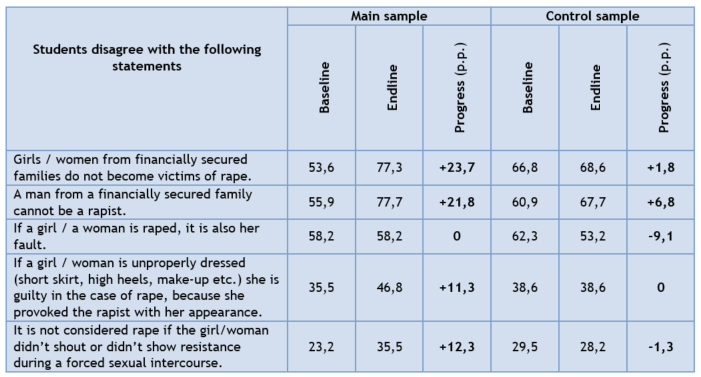
A recent study of 220 10 th -12 th grade students from the Republic of Moldova revealed that eight in 10 (both male and female) believed that a woman needed to know how to cook and enjoy cooking. When asked what they wanted most from an intimate partner, they spoke of physical aspects, how they looked. The teens also revealed that they believe that a girl who lives with a male partner before marriage is of easy virtue.
But that was before their participation in the course “ Harmonious Family Relationships,” which changed their attitudes on intimate partner violence and the roles of partners in a relationship.
The 36-hour course is the first of its kind in Moldova; a voluntary, school-based intervention on the prevention of domestic violence, and included both pre- and post- course evaluations. The project is run by the International Center "La Strada" and supported by The SVRI and World Bank Group Development Marketplace Award for Innovation on GBV Prevention and Response.
Harmonious Family Relationships Course
Approved by the National Curriculum Council of the Ministry of Education of the Republic of Moldova, the course was delivered by trained teachers over the 2016-2017 school year as part of the high school curriculum. The course was taught in 22 high schools across the country, for a total of 47 classes reaching 1,025 students.
Program materials included a curriculum, methodological guide, student notebook, and teacher’s manual. All materials were approved by the Ministry of Education.
The study looked at the impact of the gender-based violence prevention course on gender attitudes and relationship skills among students and teaching staff, and identified ways in which the course could be strengthened.
In addition to the pre- and post-course evaluations, several focus group discussions were conducted, as well as a survey with 288 parents of teenagers who participated in the course.
Some Key Findings
What do you want from an intimate partner? The course resulted in an increase in the number of students who had stopped believing that a woman must tolerate violence to keep their family together; of the students who attended the course, 88% of girls disagreed with this statement, compared with 82.1% of boys.

Every woman needs to know how to cook and enjoy cleaning? The good news is that the end-line research reveals positive changes in perceptions about family roles, this change was more significant among students who participated in the course as compared with those who did not.
A girl who dresses provocatively is NOT "asking for rape". After the course, most of the teenagers no longer agreed that a girl who lives with a male partner before marriage is a woman of easy virtue. The young people also changed their opinions about other rape stereotypes. For example, of the students who attended the course, the number who disagree that if a girl or a woman didn’t shout or show resistance during a forced sexual intercourse, it is not considered rape, increased from 23.2% to 35.5%.

Research to Practice
The evaluation study findings indicate that the “Harmonious Family Relationships” course positively influenced attitudes of young people on issues related to gender equity and violence against women.
Further, teachers have been trained to talk with their students about how to manage their feelings, how to communicate as a couple, and how to recognize and prevent domestic violence. The government recently gave approval to extend implementation of the program through the 2017-2018 school year.
Given the promising findings and the acceptance of the course by participants, teachers and policy makers, the authors of the research have recommended that the Ministry of Education of the Republic of Moldova continue to scale up the intervention, and increase the length of the course so that the curriculum can be taught in schools for over two years.
Building on the research and with a view to strengthen the program, La Strada will continue to research and discuss different aspects of the program with implementing partners, including age of the participants, length of the program and identification and selection of facilitators, i.e. which teachers are best suited to implement the curriculum. Some students felt that the course should be taught to students in the 9th grade (15 years old), because, "most adolescents make mistakes until they reach high school. High school is already (too) late."
What do you think about this? Is high school (16-19 years old) already too late to teach students about gender stereotypes, intimate partner violence and how to communicate in intimate relationships?
Read the full research report online here.


Join the Conversation